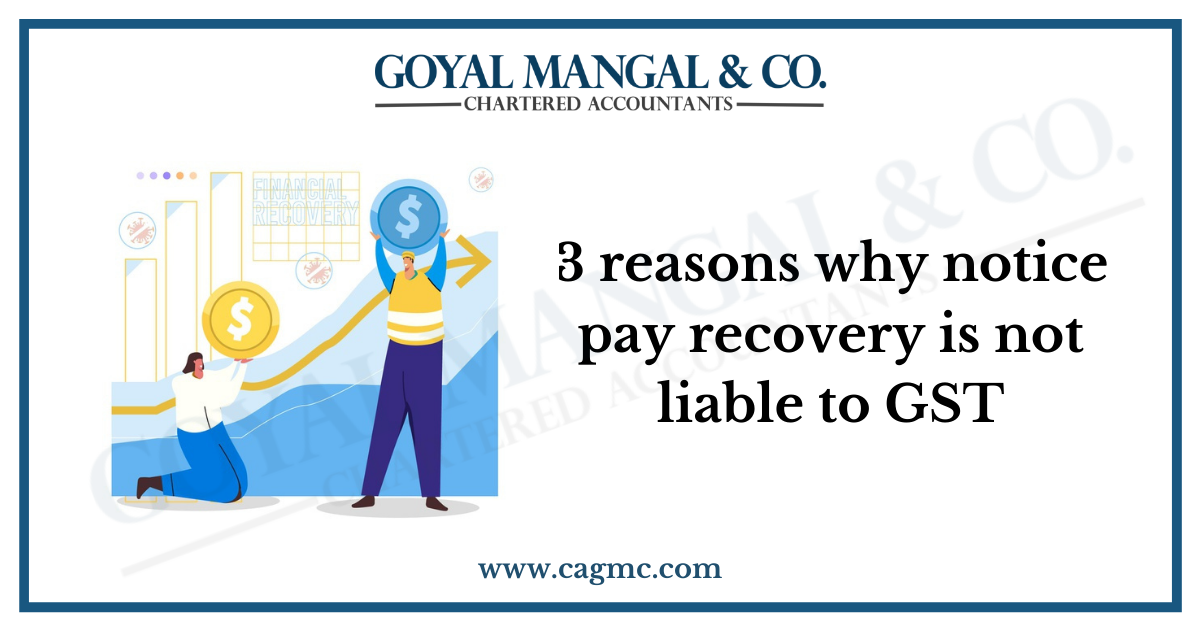What is notice pay recovery?
When an employee joins or leaves an organisation, he/she is bound by the terms and contracts of employment. When an employee leaves an organisation, he/she is required to serve the notice period before resigning and most of the employee agreements contain a clause stating that if an employee wants to leave the organisation without serving the notice, then he/she is required to pay an amount equal to the unserved notice period and this is called notice pay recovery which is either recovered from the employee or deducted from the salary payable to him.

There are 3 reasons why notice pay recovery is not liable to GST:
According to Section 7 of the CGST Act, 2017, any transactions must fulfil the following conditions to be treated as supply:
- Should qualify as goods/services
- The transaction should be made or agreed to be made
- There should be an element of consideration for the supply.
- It should be carried out in the course and furtherance of business.
When analysed carefully, notice pay recovery does not qualify all the conditions as a ‘Supply’ and hence this is not liable to GST. The detailed reasons for the same are as follows:
- Not a voluntary act:
-
- When an employee joins or leaves an organisation, he/she is bound by the terms and contracts of employment. A contract of employment is a contract between employer and employee where employee provides services to the employer in consideration of ‘salary’ and this contract also includes recoveries on account of breach of such contract.
- This contract ensures the employer in case of early cessation of service by the employee. The main purpose of this contract is not to recover the notice pay which arises at the time of breach of contract but to provide the employment service.
- The term ‘made or agreed to be made’ under the definition of ‘supply’ suggests or acts as a voluntary act of the service provider. At this juncture it is worth nothing a ruling under the Australian GST Law, in the case of “Shaw vs. Director of Housing and State of Tasmania (Nos. 2), 2001 TASSAC 2”.
- Therefore, the act of notice pay recovery arises as a condition of breach and is not a contract in itself to qualify as supply.
- Does not constitute toleration of an act by the employer- Employer is not the supplier:
-
- A supplier may be said to be making a supply by “agreeing to the obligation to refrain from an act, or to tolerate an act or a situation, or to do an act”, only when there is a specific performance obligation to do so, to honour the contract.
- Notice pay recovery is a compensation for any damage or injury caused to the employer and not a benefit arising to the employer.
- Contracts containing non- compete clauses, contracts imposing restraint on the geographical operations are certain examples which are executed with an intension of creating performance obligation between the parties to the contract qualify as services under the category “agreeing to the obligation to refrain from an act, or to tolerate an act or a situation, or to do an act”.
- The contract of employment is between the employer and employee. The employee promises to serve the notice period which is repudiated by employee and subsequently leads to a breach of contract requiring remedy.
- The remedy in the form of liquidated damages as already mentioned in the contract becomes enforceable and thereby the recovery of notice pay serves as a remedy for such injury or damage. It can be said that there is no supply affected by the employer on recovering a pre- agreed sum for repudiating the contract of employment.
- Damage vs consideration:
-
- Damage in general sense means compensation for loss or any injury caused by the wrongful act of the other. Notice pay recovery is a damage arising by breach of contract of employment by employee which reduces the time period of employer to find a competent and suitable replacement.
- Damage is not a voluntary act of employer to recover the notice pay damages by employee and it is not an alternative mode of performance.
- According to CGST Act, 2017 “Consideration in relation to supply of goods or services or both” is defined as under:
-
-
- It becomes necessary to evaluate the meaning of the word “in relation to” used in the aforesaid line. In the case of ‘Doypack Systems Pvt. Ltd. v. Union India & Ors.[1988] 2 S.C.C. 299, the Supreme Court has categorically held that the phrase “in relation to” is equivalent to the phrases “concerning with” and “pertaining to”. Therefore the phrase “in relation to” used in the line of the term “consideration” provides a connection with the act of supply.
- The purpose of the contract of employment was only to sign up an employee on roles of the company in return for the employment service offered by the employee and not to recover notice pay.
- The notice pay recovery neither is a consideration, nor does it is flow at the discretion of the service provider, further that, there is no benefit accruing to the employer, moreover he has suffered from the sudden exit of the employee.
-


